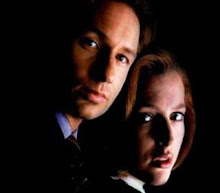Sunday, July 12, 2009
Ivan the Sad
Thursday, July 2, 2009
Dashing, no Dashiell
Me Tarzan, You Silly
Love in the time of Canada
Saturday, June 27, 2009
Tough Guys screw around

Thursday, June 11, 2009
These Violet Eyes are smiling...

Monday, June 1, 2009
Here, There, Neverwhere

Neverwhere by Neil Gaiman
Gaiman introduces a whole new context for the term 'London Underground' with his book Neverwhere. The story is set in the tunnels and sewers below the London. The book opens with Richard, a lawyer just beginning to make his mark, finding a scared and battered girl, Door, on the street. Instead of ignoring the girl (much to the disdain of his girlfriend Jessica) he takes her home and eases her back to health with the help of characters from the underground. Unfortunately after the incident he is no longer visible to the people of 'London Above'. He joins a quest with Door, her friend des Cabras, and their bodyguard Hunter to find her parents' murder in hopes of going home to his reality. The entire story was well written and fast paced. We see growth in all of the characters, but a larger change is seen in Richard. A common man with little passion for his life and scared of everything becomes a warrior. One of the best scenes in the story involves Richard confronting himself to discover who he is and what reality he is living in. Richard winds up talking to himself and one of the details like - he hears his friend Gary (that is really him) talking to him with the voice that is his own, and not the voice from answering machines, video cameras, or other electronic devices - the voice of what he sounds like inside his head, not outside. This is a fantastic detail that everyone can relate to. How many times have we heard ourselves recorded only to wonder - do I really sound like that?
One can't help wonder with this attention to London's homeless and poverty stricken, is Gaiman trying to push a more important agenda with this novel? The story is fantastic on it's own, but it seems to have an obvious message to us of the 'London Above' world. Maybe we should stop ignoring these people's voices in the streets and subways. Maybe they have something interesting to tell us. What are you're ideas?
